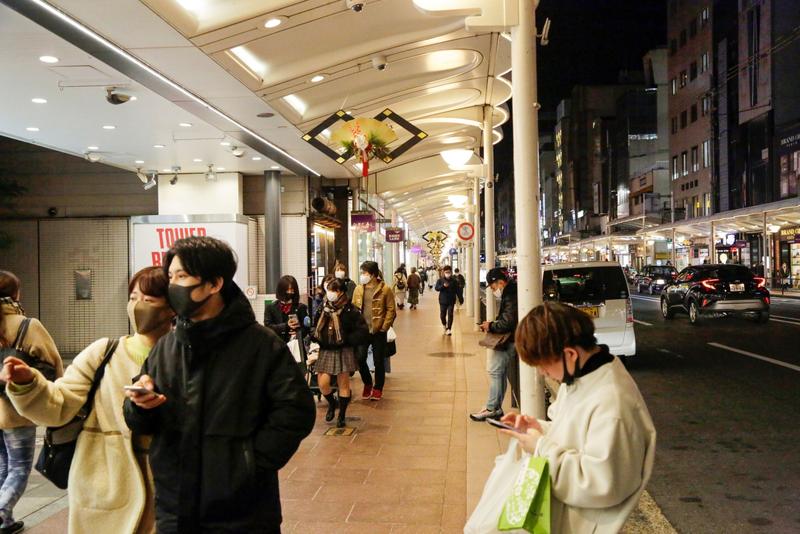 Visitors on the Kawaramachi shopping street in Kyoto on Jan 14, 2021. (PHOTO / BLOOMBERG)
Visitors on the Kawaramachi shopping street in Kyoto on Jan 14, 2021. (PHOTO / BLOOMBERG)
The world’s most rapidly aging society has long struggled to talk to its youth. That’s a disconnect that’s turning deadly in the pandemic.
The difficulty in persuading young adults to upend their lifestyles to prevent COVID-19’s spread has challenged countries across the globe. Yet nowhere are the stakes higher than in Japan, where nearly a third of residents are over the age of 65, and the virus response depends on voluntary cooperation.
The nation has so far relied on people changing their behavior in its largely successful fight against the virus, as authorities lack the legal ability to enforce lockdowns. But while calling for cooperation worked in the early days of fighting an unknown pathogen, like their global peers younger Japanese are increasingly hit with virus fatigue. That’s left officials struggling to persuade a demographic that’s least likely to be struck by a harsh bout of COVID-19, but most likely to pass the virus on.
The nation has so far relied on people changing their behavior in its largely successful fight against the virus, as authorities lack the legal ability to enforce lockdowns
Government officials and health experts have been exasperated at their inability to communicate with younger people -- and sometimes expressed incredulity at the fact that they don’t read newspapers or watch TV, the methods typically used by the government in Japan to reach wide audiences.
Younger people are “one of the key factors in controlling the virus spread,” said Hitoshi Oshitani, a professor of virology at Tohoku University and a member of the expert panel advising the government, “but these are the most difficult people to send a public health message to.”
Authorities have tried various approaches to get the youth on board, as winter tests Japan’s less restrictive strategy and cases spike. Prime Minister Yoshihide Suga has appealed to their emotions, pleading with them to think about the lives of their grandparents. Japan’s virus czar Yasutoshi Nishimura invoked self-interest, raising the specter of a tougher job-hunting environment should the pandemic drag on and continue to impact the economy.
READ MORE: Japan prepares law to punish those who break virus rules
Mixed Messages
Other attempts have fallen flat. In August, Tokyo Governor Yuriko Koike released a video with popular YouTuber Fuwa-chan, where the two discussed lifestyle changes to help combat the virus. The video garnered around 370,000 views. A separate behind-the-scenes episode, where Fuwa-chan told jokes as she applied makeup and fretted about how to act with the governor, but said little about the virus, got over a million.
Suga himself, who is struggling with collapsing approval ratings during the latest virus surge, sought advice this week on how to use social media to better communicate his policies
Suga himself, who is struggling with collapsing approval ratings during the latest virus surge, sought advice this week on how to use social media to better communicate his policies, according to a report.
In interviews with Bloomberg News, multiple students and young professionals say the government’s communication has failed to be empathetic to their situation and is unconvincing.
“During the prime minister’s press conferences, there’s no words of comfort or gratitude for the young -- instead he just says the youth are infecting the elderly and need to stop. It’s not right,” said Koki Ozora, a 22-year-old college student who runs a mental health hotline for young people. He criticized politicians’ habit of holding dinners even as virus cases spread, and called for authorities to show more sympathy with young people.
“People in government tend to be more conventional and like to rely on methods that’s been used before,” said Makoto Shimoaraiso, a member of the coronavirus strategy office at the Cabinet Secretariat. “This is something I think many countries are struggling with.”
In Canada, Hollywood actor Ryan Reynolds recorded a message in August telling young people to act more responsibly. A German commercial that hailed a young couple being couch potatoes as heroes went viral in November. Yet these measures also appeared to have limited impact amid spiking virus cases.
ALSO READ: Japan to ban entry of foreign athletes during virus emergency
No Voice
About a fifth of the more than 300,000 confirmed infections in Japan are among people in their 20s — the largest proportion of any age group. Because they are younger and more mobile, that age demographic is also the most likely to pass on the virus and be part of super-spreader events.
While Japan’s youth are interested in social issues such as climate change and gender equality, most youth don’t see politics as a way to bring about change, said Kazuma Ito, the 22-year-old founder of PoliPoli, a website that helps communicate concerns among younger generations to politicians.
“It’s very difficult for young people to have a voice in politics,” he said.
One way to appeal to youth on COVID-19 is by placing the wellbeing of their social group on their shoulders, said Dominique Brossard, a professor specializing in science communication at University of Wisconsin at Madison.
She pointed to the decades-old “Friends don’t let friends drink and drive” slogan in the U.S. as one successful campaign that helped lower incidence of youth drunk-driving. Simply relaying information about the virus may have limited effectiveness with the younger generation, who are accustomed to being bombarded with a constant stream of content.
The pandemic has also robbed young people of economic opportunities as jobs disappear. Many of Japan’s most coveted jobs at big companies start with being hired right out of college, but the jobs-per-applicant ratio for those openings was at a six-year low in 2020 -- with 122,000 fewer spots anticipated compared to the year earlier.
“Even if the young make a big effort to stay home, there’s little benefit we can receive in the future,” said 19-year-old college student Lily Yoshida.


